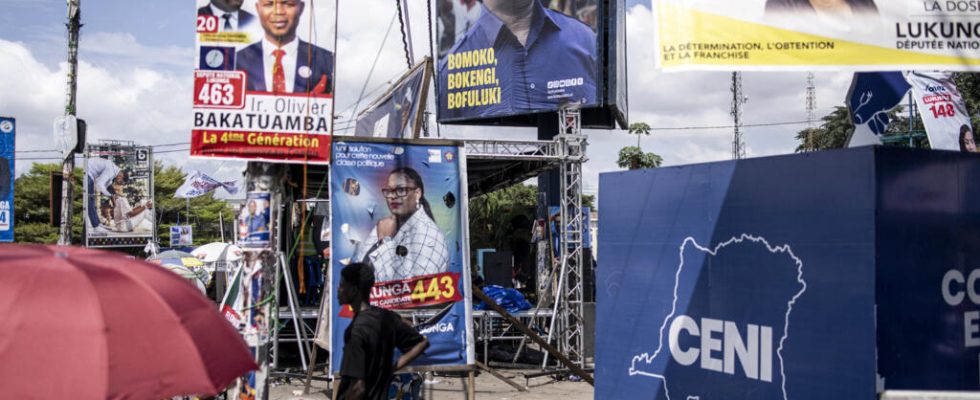The presidential, legislative, provincial and municipal partial elections take place on December 20, 2023 in the Democratic Republic of Congo (DRC). A vote for which the majority of the country’s population, minors, do not vote. In Kinshasa, the teenagers we met oscillate between a desire to take advantage of the school holidays, disinterest in politics and lack of confidence in the candidates. Reporting.
4 mins
From our special correspondent in Kinshasa,
On the mama yeyo field, near the large wasteland of the same name, football matches take place one after the other. Teenagers, aged 12 to 18, crisscross every meter of land, running frantically between the holes, looking for a ball.
These are the school holidays in the Democratic Republic of Congo (DRC). So 13-year-old Arnold is even further away from politics than usual. As the general elections approach, which must notably appoint the new president of the DRC, the kid, white jersey on his shoulders, has other concerns. “ I think about it often, but not too much eitherhe slips timidly. I’m going to follow what’s going to happen on Wednesday. I hope we will have good people for our country “.
“I won’t be able to vote, but I will be connected »
Arnold is one of the 46% of Congolese aged 0 to 14 who will therefore not be able to vote. A country where the median age is 16.7 years and the majority of the population – according to CIA World Factbook – is minor. Which doesn’t stop 16-year-old Prince from keeping an eye on the events of the last few days. “ It’s interesting, but what they do [les politiciens, NDLR]it doesn’t encourage one to be interested in ithe blurted. I don’t think politicians are interested in young people “.
A little further on, Henock, 17, a resident of the CFS Comet (CFSC), is a little more enthusiastic. “ I followed the campaign a lot because we are lucky to be able to vote and to be able to choose our president so that the country develops even morehe emphasizes. I won’t be able to vote, but I’ll watch it all. I will be connected “.
Henock speaks under the watchful eye of Serge, sports secretary and supervisor of the CFSC: “ In Kin, it’s very difficult to see a 15, 16 year old boy interested in politics. Because they are more about football, martial arts and music especially. If you see a child of this age following politics, it may be because he has an older brother in the neighborhood who does it and who trains him a little in this area. »
On the Place des Evolués, a place where young people from Kinshasa like to meet, the electoral fever has not won over Althéa, 14, and her friends. Leaning against a popcorn stand, the young girl says, without hesitation: “ All that doesn’t interest me. Already, because I am not yet old enough to vote. » Asked whether, conversely, politicians are interested in Congolese youth, she responds bluntly: “ I’m going to say that they only think about themselves. They have their money and they don’t see that many young people have finished school, but don’t have a job. »
Read alsoGeneral elections in the DRC: where are the women?
“ Although they do not participate in this vote, youth still represent a force »
This impression that under-18s, despite their very large numbers, are not a priority is partly confirmed by Ithiel Batumike who works on political and electoral issues at the Ebuteli research institute: “ Apart from issues related to education, free education, issues of access to health care or even those related to agriculture so that there is more food, we have not seen enough speeches aimed at families, debates on the supervision of youth, others on the question of the eradication of Kuluna phenomenon [des gangs de jeunes, NDLR] or even on the fact of knowing if there are homes which take care of orphans, idle young people. »
But Ithiel Batumike nevertheless recalls: “ We are facing a large part of the population which, although it does not participate in this vote, still represents a force. Because we saw that during the various meetings during the electoral campaign, there were often many minors in the crowd to listen to the different presidential candidates. »
These millions of young people will soon be old enough to express themselves. According to projections from the National Strategic Plan for Development (PNSD), a UN agency, the Congolese population is expected to increase from 95 million inhabitants in 2022 to 133 million in 2030. With ever more young people.
Read alsoPresidential election in the DRC: climate change and the environment, the forgotten ones of the campaign
